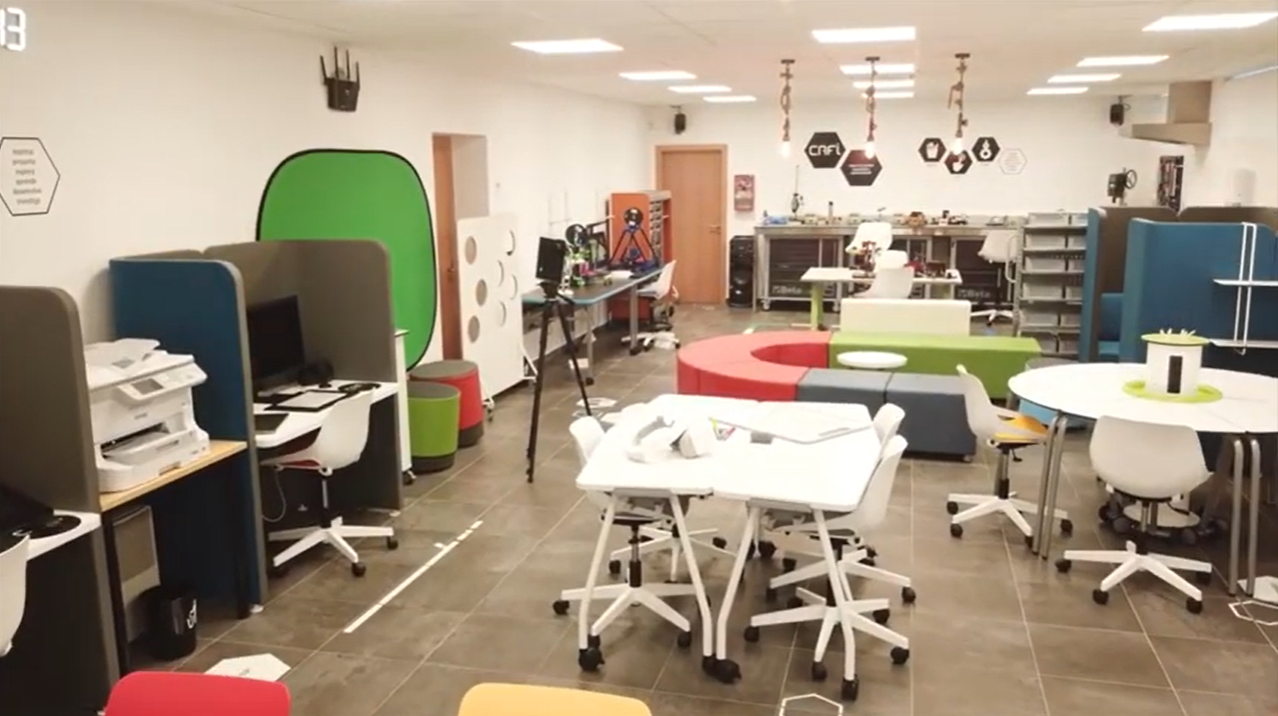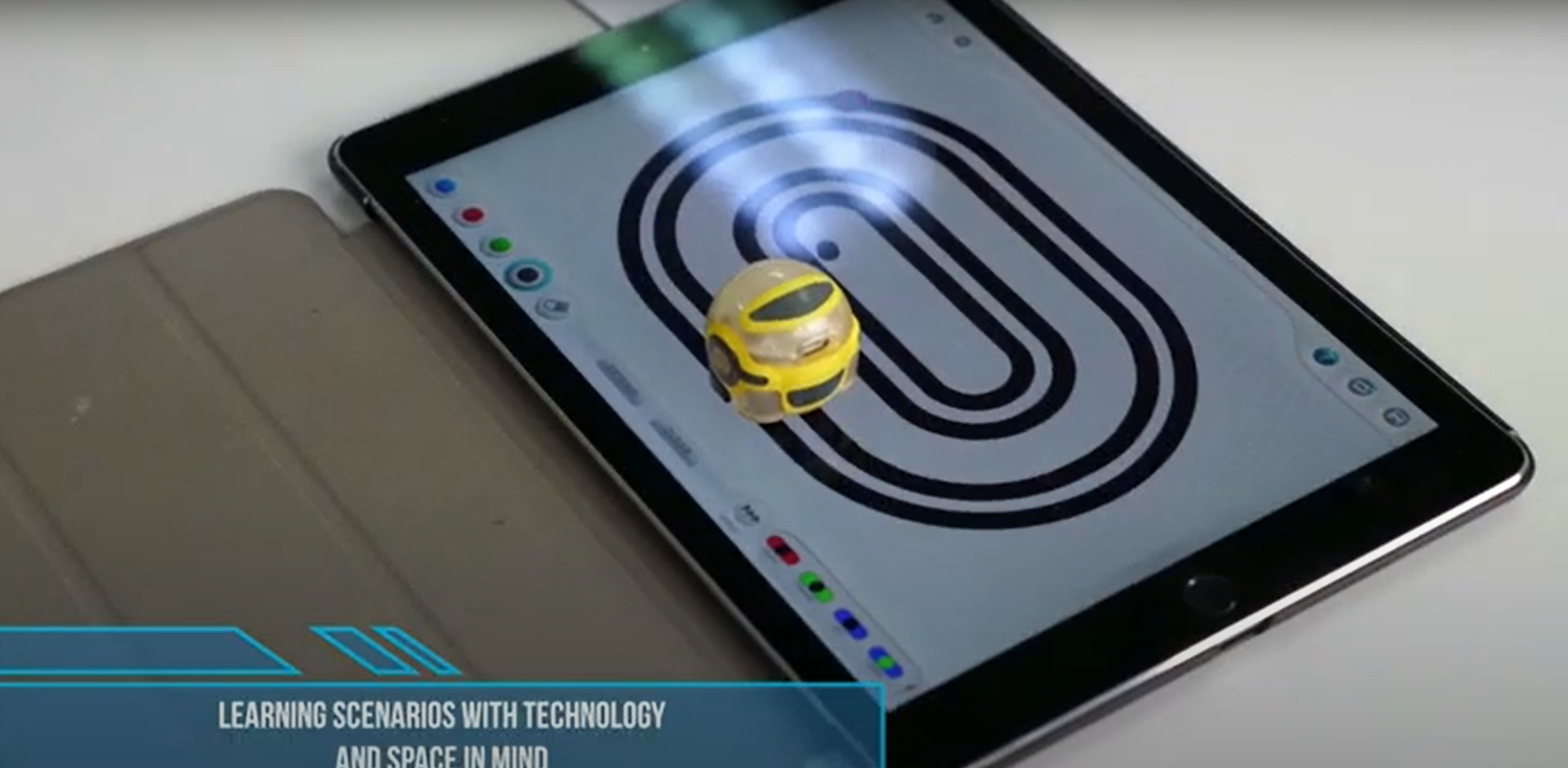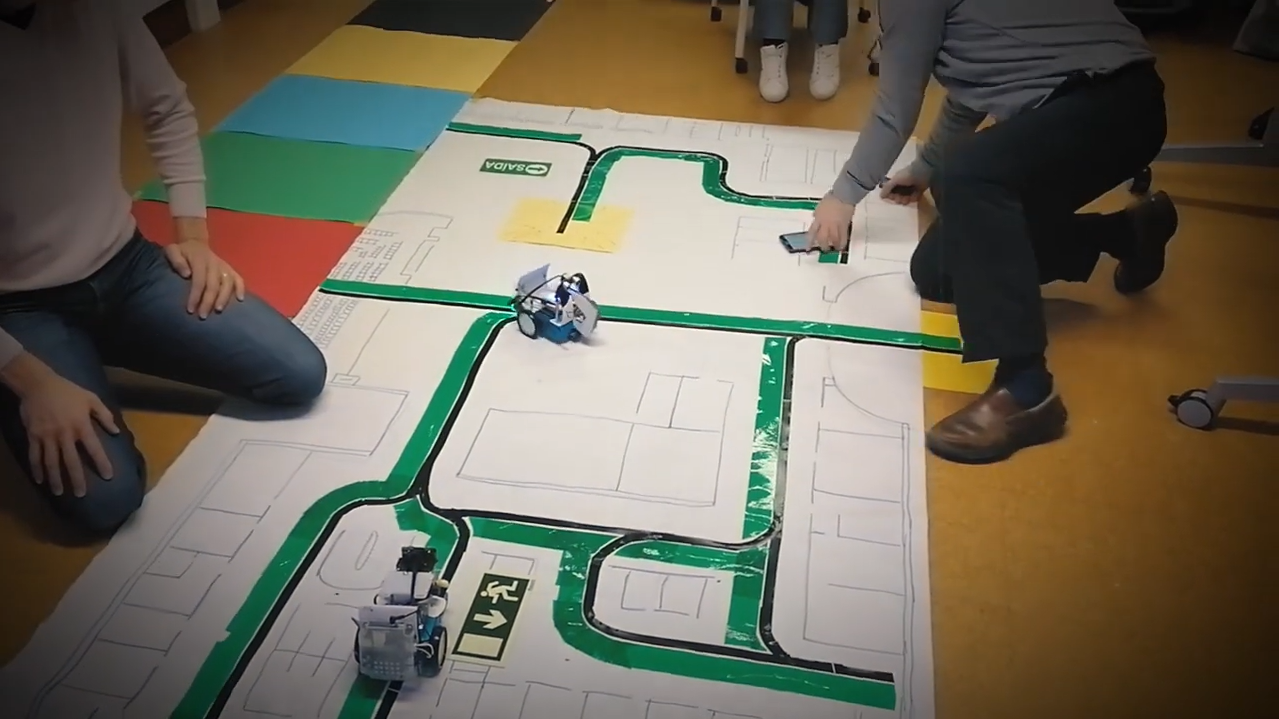
What is DesignFILS?
Technology is advancing day by day and like all countries, our country follows the changes brought by new technologies. The development of societies lies on adapting to these changes. However, adopting these changes as a society is possible through innovative approaches being embedded into country policies, and the most important actors of this process are school-age students, the active workforce of the future. Creating innovative flexible learning spaces for students and raising them as self-confident individuals who have 21st century skills are the duties and responsibilities of policy makers in the field of education.
Project Trainers
|
Sümeyye Hatice ERAL |
Merve DİLEK EFE |
|
Dr. Tunç Erdal AKDUR |
Büşra SÖYLEMEZ |
|
Ceyda ÖZDEMİR |
Özge TAŞTAN |
|
Şükran KOÇ |
Zeynep SAV |
|
Taner GÜRSES |
Ayşe SAYLIK |
|
Abdulhalik Kürşat Arık |
Mesut Üstün |
|
Adil Tuğyan |
Murat Kuvvetli |
|
Aybüke Çapar Çetin |
Mustafa Atlı |
|
Azime Tulan |
Mustafa Kemal Pişkiner |
|
Bilge Akıncı |
Mustafa Soruç |
|
Birsen Durmaz |
Nida Demir |
|
Bora Uğur Bodur |
Nurcan Uysal |
|
Büşra Kavan Alkan
|
Oktay Aksoy |
|
Canan Han |
Özcan Çiçek |
|
Demet Betül Güler |
Özge Ince |
|
Duygu Efetürk |
|
|
Elif Dursun |
Özgül Mutluer |
|
Elif Fergane |
Özlem Akin |
|
Engin Bayra |
Öznur Cam |
|
Fadime Üstüner |
Sedef Solak |
|
Fatma Aslan Uçar |
Seher Demir |
|
Güniz Çalışkan Kılıç |
Seher Yıldız Şal |
|
Günnur Sönmezler |
Selda Topal |
|
Hediye Taşkın |
Selen Avcı |
|
Hüseyin Delil |
Selin Sarıça |
|
Işil Gülmez |
Sertaç Ateş |
|
Lamia Büşra Yeşil |
Sevinç Özdemir
|
|
Latife Çeri |
Yasemin Altindal Doğaner |
|
Mahmut Uzun |
Yasin Kaplan |
|
|
Zehra Kaya |
|
|
Zuhal Özbay |
|
Petra Boháčková |
|
Bohuslav Hora |
|
Gabriela Střelcová |
|
Gabriela Hanzlíková |
|
Sylva Sýkorová |
|
Pavel Kučera |
|
Ondřej Vasiluk |
|
Zuzana Jánošková |
|
Růžena Slavíčková |
|
Milada Polačková |
|
Conchi Fernández Munín |
|
Esperanza Vázquez Iglesias |
|
Saleta González Carnero |
|
Sergio García Liñares |
|
Leo Vázquez Chousal |
|
Marta Comesaña Gato |
|
|
|
Margit Pollek |
Chris Pollek |
|
Regina Brandtweiner |
Bernhard Racz |
|
Sabrina Laschet |
Elena Revyakina |
|
Siegfrid Opelka |
Hermann Morgenbesser |
|
Christoph Cuscoleca |
Bernhard Racz |
Project Partners
As the coordinator institution of Design FILS project The Directorate General for Innovation and Educational Technologies (YEĞİTEK) is a unit of the Ministry of National Education responsible for studies supporting the technology use, integration and mainstreaming of technologies in education. Some of the main field of work are to monitor and evaluate the new technological developments implemented in education, and enabling the use of technological opportunities in education throughout the country effectively and commonly and enabling every student to benefit from information technologies.
Directorate General will have a crucial role in the dissemination and the mainstreaming of the project with its experience in teacher trainings.
The roles of MoNE YEGITEK in this project will be as follows:
- To establish Project Team and management plan
- To follow all tasks in management plan and activity process
- To decide on related matters with Project Team
- To support all project stakeholders
- To carry out dissemination activities
- To manage financial provisions in the project and enable effective management of financial issues with Project Team.
The Centro Autonómico de Formación e İnnovación is a teacher training and innovation centre. It forms part of the Teacher Training Network in the Ministry of Education of the regional Government of Galicia. The CAFI coordinates and is responsible for teacher training 36,000 professionals at all non-university levels in Galicia.
It delivers training to all teachers in the region of Galicia in the shape of face-to-face regional events, online courses and in-house training. The centre is in charge of online teacher training in the region, the design and evaluation of innovative programmes and other innovative reform initiatives, including adaptation or development of training models which are then applied to the teacher training network.
Main role of CAFI in this Project;
To contribute on planning and implementation processof online and facetoface teacher trainings
European Schoolnet (www.europeanschoolnet.org) is the network of 34 Ministries of Education from across Europe, leading educational innovation at European level. As a major international think tank, European Schoolnet operates key European services in education on behalf of member Ministries of Education, the European Commission, and industry partners
EUN has been active in building and expanding a network of National public authorities in order to allow them exchange and collaborate in innovating education in Europe. It has been supporting its 34 members by identifying and testing innovative ICT practices, sharing evidence about their impact, and encouraging the mainstreaming of teaching and learning practices.
Main role of EUN in this Project;
To generate a Metodological Framework for Innovative Classroom
Hacettepe University (H.U) is one of the oldest and leading universities in Turkey. The vision of Hacettepe University is to become a leading university where the individuals are proud to be a member of both in the national and international arena, leading the change and development
Role of Hacettepe University in this Project;
to contribute to preparation of scenario-based learning activities in accordance with flexible learning environments and the use of technology
Besides the fields of Education, Training and Continuous Professional Development, the University College of Teacher Education Vienna ensures that the demands of the teaching profession and other related professional fields are constantly met. One of the high strength of the University lies in the entegration of research-based educational competencies in all educational fields and across all age groups, which are strongly embedded in professional practice. In addition, it is well qualified with the understanding of scenario-based education system which is one of the key functions of the pedagogy presented in Future Classroom Lab Project.
Main role of Future Learning Lab Wien in this Project;
To develop learning scenerios for flexible learning spaces and organize teacher trainings
Universidade de Lisboa is one of Europe’s leading universities. The University of Lisbon, through its Institute of Education, has developed the first and only innovative learning environment in Portugal that is specifically design for supporting teachers’ training, the FTE-Lab, the Future Teacher Education Lab.
Main role of Universida de Lisboa in this Project;
To prepare pedagogical guidelines for traiers
Základní škola Dr. Edvarda Beneše is a well-equipped school which has FCL, uses ICT technologies, and has specialized teachers in using technology and integrating it into flexible classroom environments.
Roles in this project;
- To contribute on ICT and augmented reality,
- To contribute on desiging flexible learning spaces,
- To meet the need for the workforce under the titles of "Science, Technology and Innovation" in an economical way which is also stated in turkey 10th Development Plan and being designed 11th Development Plan.
- To support the acquisition of 21st century skills, such as problem solving, critical thinking, productivity, teamwork and digital skills in innovative learning environments designed correspondent with the objective of 'transformation of knowledge into skill' in 2023 Education Vision.
- To support the implementation of the scenarios in flexible learning areas by strengthening teachers' skills in developing interdisciplinary learning scenarios with the contribution of project partners.
- To support the dissemination of good examples and practices in flexible learning areas within the framework of the European Union.
- To design learning environments in accordance with the requirements of the age by using innovative implementations in the digital field and to study on improving both academic achievement and creative thinking skills of students by developing their learning capacity with innovative learning scenarios in these learning environments.
Design of the Project / MoNE YEGITEK
- Need Analysis
Methodological Framework for Innovative Classrooms Training / EUN Prt.AISBL Teacher Trainings
- ICT in Innovative Learning Spaces -UNIVERSIDADE DE LISBOA
- Innovative learning spaces Pedagogy and Space Design - CAFI
- A Whole Approach to Future Classroom Lab - EUN PARTNERSHIP AISB
- Scenario-based Learning - FUTURE LEARNING LAB WIEN
- Online Teacher Trainings – MoNE YEGITEK
Scenarios Development / PADAGOGIS CHE HOCHSCHU LE WIEN
- Scenario Analysis & write-up
Establishing Online Training Platform / MoNE YEGITEK
- Integration of the innovative scenarios and contents on the platform
Project Evaluation & Dissemination / MoNE YEGITEK
- Conducting dissemination activities using conferences, trainings and online platforms.
- Organizing International Design FILS Conference in İstanbul between 20-21 June
- Methodological Framework for Innovative Classroom Trainings: : TR, EN, DE, CZ, ES, PT
- Guidelines for trainers: TR, EN, DE, CZ, ES, PT
- Evaluation Tool for trainings
- Scenario-based learning activities
- Online Training platform
The main objectives of the project are to create new learning environments using information and communication technologies and to develop high-level skills such as scientific, creative and critical thinking by integrating innovative practices in education with STEAM Education that supports 21st century skills and multi-disciplinary learning areas. It is pretty important for the adults to have digital competencies and to use technology correctly in order to grow up healthy individuals in the society. In this context, there is a need for competent teachers and educational first. The trainer trainings for the significant infrastructure will be provided to the teachers during the project.
In addition, it will be given importance to make the educational scenarios to ensure sustainability, which are challenging for students, and based on with real life.
Students are individuals mentally ready to question and any practise they will experience under STEAM education will reinforce their learning desires and support their creative thinking skills.
Plot studies will be carried out to evaluate the consistency of the project for its purposes, to eliminate deficiencies and improve the activities. Also, expert teams in the field will evaluate the process.
Here you will find 12 inspiring learning scenarios that demonstrate how to put the key FILS ideas into practice, and literature review to support these learning scenarios. Together, they bring innovative pedagogical approaches that draw on the current educational trends and could be tried out in early childhood education, primary and secondary schools by teachers, and in teacher education by teacher trainers for teachers’ professional development. They are aligned with the Methodological Framework for Innovative Classroom Training (To access the document in the following languages please click: TR, EN, DE, CZ, ES, PT ), and encompass approaches that require careful consideration of learning space and use of technology for teaching and learning.
The Literature Review (To access the document in the following languages please click: TR, EN, DE, CZ, ES, PT) aims to give you the theoretical and practical knowledge about the approaches described in Learning scenarios.
The 12 Learning Scenarios aim to give you some ideas of the type of learning approaches, activities, content and use of space (the concepts of six learning zones) and technology when designing your active learning lesson plans. Scenarios are accompanied with introductory videos.
For Sample Scenarios for School Education (all levels) please click here.
Contact
Republic of Türkiye Ministry of National Education Directorate General for Innovation and Educational Technologies
Emniyet Mah., Milas Sokak, No.8 06560 Yenimahalle / ANKARA
Phone: +90 (312) 296 94 00/ 94 04
DesignFILS Project Team
Project Coordinator: Sümeyye Hatice ERAL
Project Management Team: Merve DİLEK EFE, Dr. Tunç Erdal AKDUR, Büşra SÖYLEMEZ, Nevzat ÜNSAL
Continuing Professional Development Team: Büşra SÖYLEMEZ, Ayşe SAYLIK, Özge TAŞTAN









